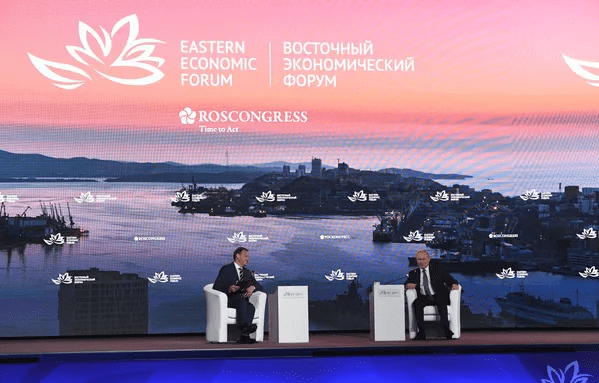Author: Fabrizio Vielmini – 23/08/2022

Apart from the Ukrainian fronts, Russia and America struggle across the global diplomatic arena. Here, Washington strives to isolate Moscow while the latter continues to build networks aimed at challenging Western pretention of still being the Centre of international politics.
Along with the raising number of visits by Russian diplomats in the capitals of the Third World, Moscow organizes high-level international events at home which stimulates international cooperation and assist in the national economy’s re-orientation away from Western markets.
After the St. Petersburg International Economic Forum last June, on 5-8 September it will be the turn of the Eastern Economic Forum (VEF according to the Russian acronym of Vostochnyj Ekonomicheskij Forum), which takes place annually in the capital of Russian Far East region, Vladivostok[1]. Both events are international platforms intended to foster communication and cooperation between members of the business community, political figures, experts, and journalists from Russia and other countries. Previously, as the St. Petersburg forum was intended to build ties with European partners, the VEF initial mission was to improve cooperation with countries like Japan, now part of the Western-led sanction coalition. In the context of the unprecedented pressure on Russia and comprehensive global crisis created by the Western sanction offensive, the VEF assumes a special and higher significance for Russia, as part of the push to re-orientate the national economy towards the countries of East Asia outside of the Anglo-American clout, in wake of Russia’s Pivot to Asia strategy[2]. Thus, Russia attempts to build alternative schemes across the global periphery.
Indeed, this year VEF edition, the seventh since the forum’s launch in 2015, will be under the banner “Towards a Multipolar World”. The opening event will be dedicated to “Russia’s place in the world structure” (with the interesting sub-title “diamond crystallizes under pressure”).
Another of the main VEF panels, named “Global division of labour: rejection of old and creation of new ties” reflects the special attention paid in Moscow to prospects of import substitution. Earlier, Russian Prime Minister Mikhail Mishustin called import substitution a national development priority worth all efforts. Thus, within the framework of the block, participants will discuss the opportunities for Asian countries to enter the Russian market and make up for the place freed by the withdrawal of Western connected foreign companies. These concerns an economy range spanning from food products to cars and aircraft parts, while the energy sector remains a long-standing area of cooperation.
Russia has a particular focus on countries like India and Myanmar, which took a neutral position towards the war against Ukraine and are nowexpected to send high standing guests to the event. The government of India has been closely implicated in the success of the previous VEF editions[3]. This year, following the visit of Indian National Security Advisor Ajit Dowal to Moscow on 17-18 August, Russia and India raised the perspective to recognize their respective payment systems (Mir and RuPay), what would further weaken the Biden Administration’s attempt to cripple Russia’s foreign trade excluding national companies from the SWIFT system.
Russia is then trying to leverage the consequences of the Ukrainian conflicts in its relation with East Asian countries. The Secretary of the Russian Security Council (SC) Nikolai Patrushev recently urged the high representatives of the Association of Southeast Asian Nations (ASEAN) to consider the impact of Washington’s sanctions policy against their countries in terms of higher grain prices.
The Russians also bet in the development of alternative connectivity. This will be at the core of the VEF section “Everyone has their own way: the logistics of a changed world”, where the perspective of transports across Eurasia’s Eastern range and the Arctic will be discussed. Moscow wants to improve the accessibility of Russian railways (BAM and the Trans-Siberian Railway) as well as airport infrastructure in order to structure a seamless transport and logistics space of Greater Eurasia.
The VEF provides ample opportunities for foreign corporations, the presentation of significant mutually beneficial projects by investors with the conclusion of relevant agreements. According to the organizers, the 2021 VEF edition was attended by more than 4,000 participants (including 400 CEO) from 58 countries, the most numerous delegations were from the Republic of Korea, Japan, India, China, Kazakhstan. As a result, 380 agreements, worth 3.6 trillion roubles (60 billion euro, taking into account only open agreements without commercial secrets), were concluded. The trend was rising from 2019, when 270 agreements worth 3.4 trillion roubles were signed[4].
The level of participation to the event from the Russian side testifies of the importance attached to in in Moscow. As in previous edition President Vladimir Putin and most of the ministers of the economic block will be present along with heads of the largest Russian companies. The presence of the Russian leader actually contributes to the conclusions of the deals as a guarantee of their implementation. At the previous edition Putin spoke about the results of the VEF gatherings defining Russia as an integral part of the Asia-Pacific region.
The RF President also expressed Russia’s will to make its Far Eastern regions a powerful centre of attraction for capitals and the implementation of new and innovative business ideas and economic projects. The purpose suggests how, the Forum upholds its vocation to assist in solving the problems of this sensitive part of Russia so that to attract investment capitals form the wealthy countries of the Pacific area. Last year, in the VEF framework, Russia and the United Arab Emirates raised the level of their trade and economic bilateral cooperation,[5] agreed UAE’s companies’ participation in the developing of Vladivostok port as well as in the creation of an international trade centre in the Kamchatka Advanced Special Economic Zone, first announced at the EEF 2019.
Surely, Russians will also discuss with their Asian partners moves to offset anticipated US actions in the changing geopolitics of the Asia-Pacific and Indo-Pacific regions, as the Anglo-American powers’ initiatives (IPEF PGII, AUKUS, QUAD) aimed at isolating Russia and China. Moscow considers that it is important to expand alternative cooperation with China and Asian countries both in bilateral and multi-lateral formats, within the framework of international architectures as the EAEU, the SCO, the BRICS and other associations.
Also, in full line with the current conjuncture of Russia’s life is the last thematic area “Patriotism to replace tolerance: we are ours, we will build a new world” which will discuss how to foster patriotism among the youth and how to orientate in the conditions of conflicts becoming more and more hybrid, interesting but surprising within such kind of event.
All in all, the Forum will be a test of the resilience of the Russian economy with its capacities to resist Western pressure.
[1] The Far East Economic Forum is organized by “Roscongress”, an association of the Russian Government which also sponsors other international forums, such as St. Petersburg International Economic Forum. Official Forum website: https:// forumvostok.ru/en/
[2] Russia’s Pivot to Asia – How Russia and China Have Anticipated A New Cold War. The Impact on Western Sanctions Effectiveness and the Global Implications, Asia Investment Research, March 2022 , p. 55. https://asiainvestmentresearch.org/issue/russias-pivot-to-asia-how-russia-and-china-have-anticipated-a-new-cold-war-the-global-implications?autodownload
[3] Last year, the Prime Minister of India Narendra Modi virtually addressed the plenary session of the 6th VEF where he reiterated India’s commitment of being a reliable partner of Russia given the importance of greater economic and commercial engagement with Russia in the framework of the sides’ ‘Special and Privileged Strategic Partnership’ and in line with India’s “Act East Policy’. It should be recalled that the Indian Prime Minister was the Chief Guest for the 5th EEF in 2019, the first by an Indian Prime Minister. See: 6th Eastern Economic Forum (EEF), 06.09.2021, https://journalsofindia.com/6th-eastern-economic-forum-eef/
[4] https://bloknot.ru/e-konomika/na-puti-k-mnogopolyarnomu-miru-stalo-izvestno-kakie-temy-obsudyat-v-ramkah-vostochnogo-e-konomicheskogo-foruma-966371.html
[5] In 2020, trade volumes between the Russian Federation and the UAE amounted to US$3.27 billion, a 78% increase compared to 2019, and reached US$4 billion in 2021, an increase of 21% and a record high. In January 2021, the UAE registered the Sputnik V vaccine, a symbol of the growing Russian-Emirati cooperation in investments and joint projects, with large-scale events held in Russia supporting this trend.
The Author

Fabrizio Vielmini – Specialist of Russia and Central Asia
